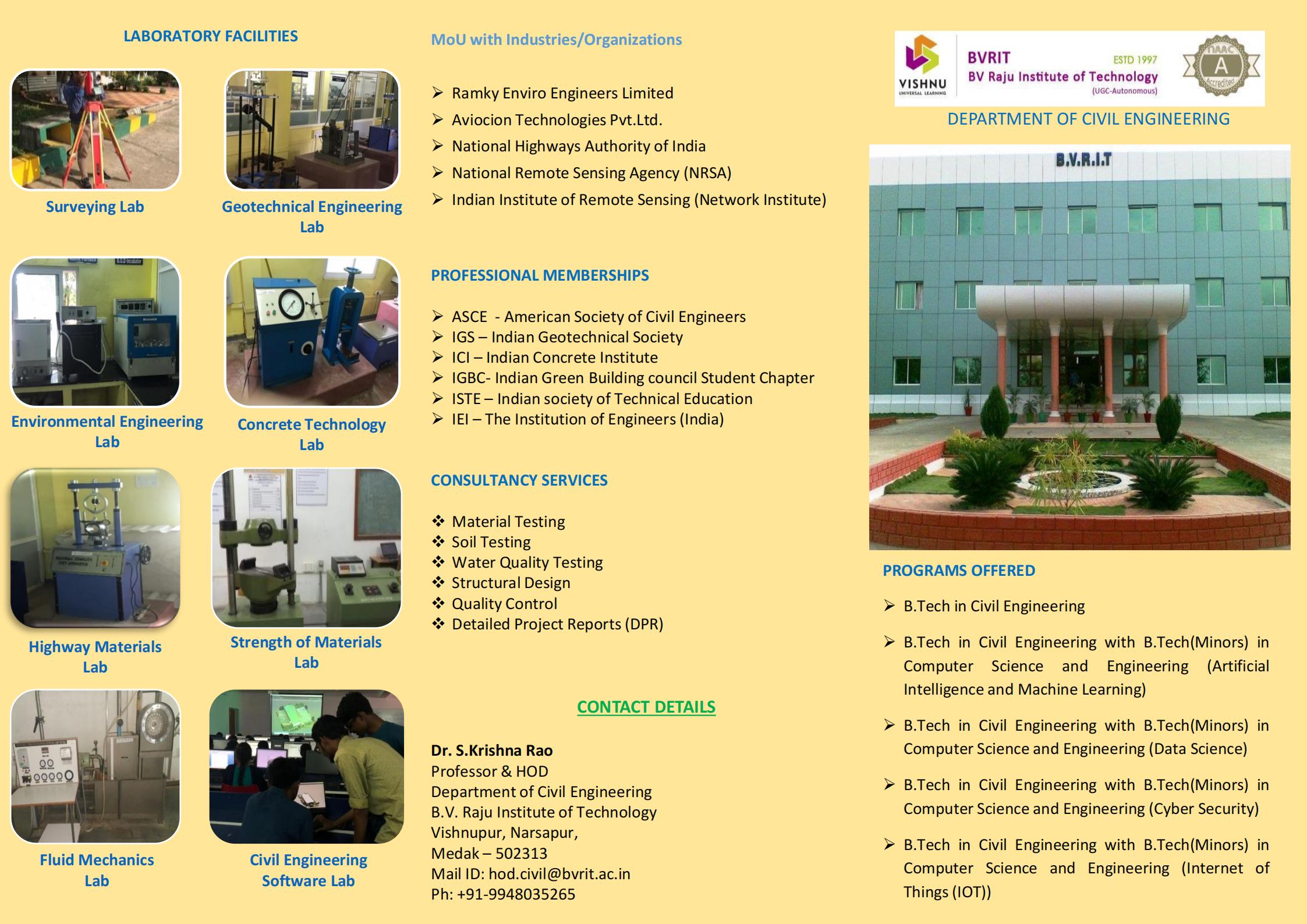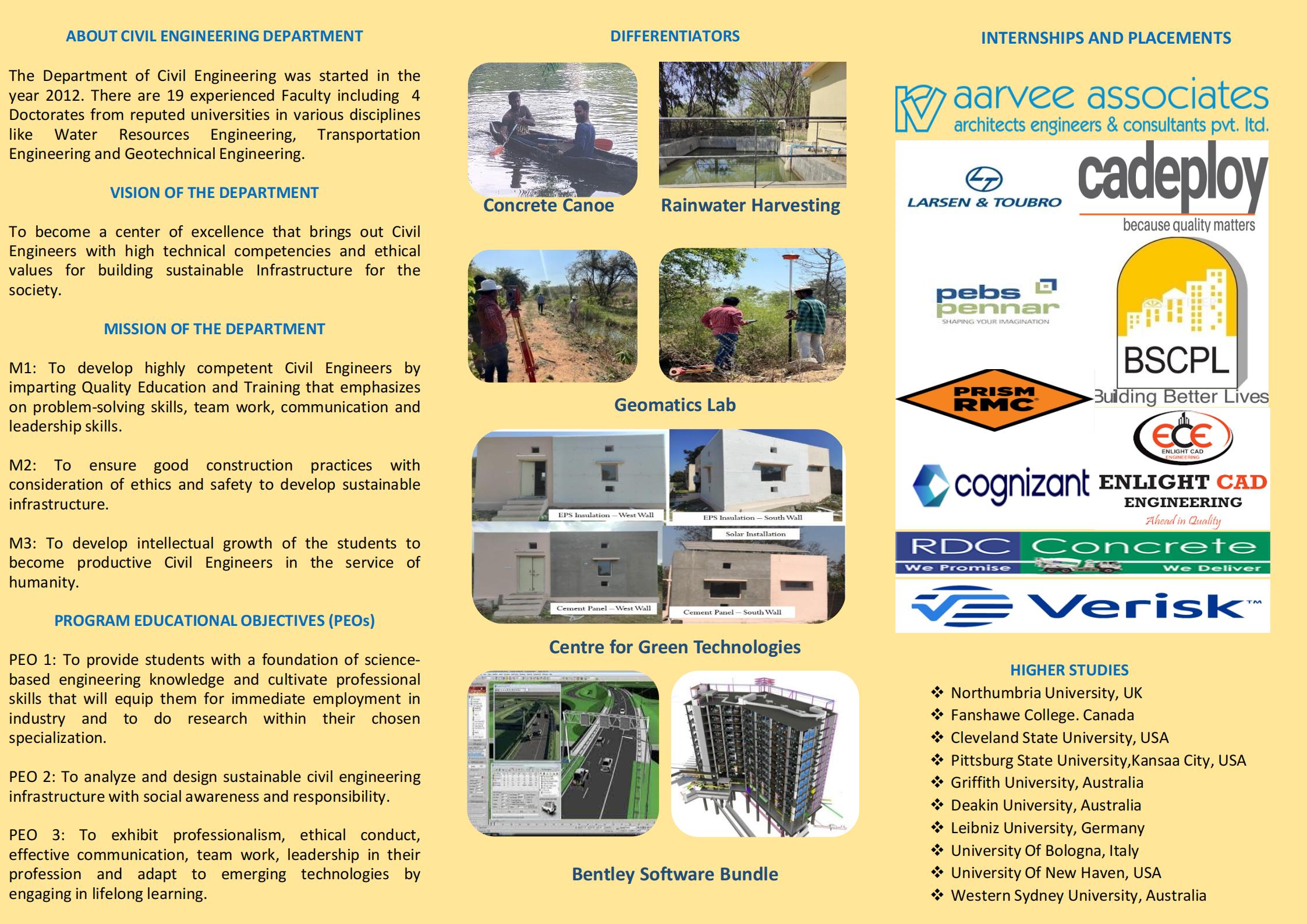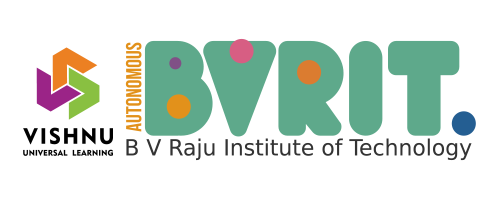Overview
About Department
Greetings from the Department of Civil Engineering at B. V. Raju Institute of Technology, located in Narsapur, Telangana. Our journey began in 2012, and throughout the past decade, we have flourished in both expertise and competency within the fundamental disciplines of civil engineering and research.
Our Undergraduate program in Civil Engineering stands as a testament to our dedication, offering students a robust curriculum supplemented by opportunities to pursue a minor degree in cutting – edge fields such as Artificial Intelligence and Machine Learning, Data science, Cyber Security and Internet of Things (IoT).
Each year, we proudly welcome 60 new students into our B.Tech. program, nurturing the next generation of innovative engineers and scholars. At our department, we deliver a science-based engineering curriculum designed to equip students with technical expertise, foster problem-solving abilities, and inspire innovation in emerging technologies.
With a diverse array of optional courses, we offer students a wide range of avenues to explore their interests. Our curriculum remains dynamic, regularly updated to integrate the latest scientific and technological advancements.
Encouraging undergraduate students to engage in various research projects is a cornerstone of our department’s ethos. Through our active research groups, we facilitate collaborative and interdisciplinary research endeavors, supported by state-of-the-art facilities dedicated to academic and research pursuits.
With a distinguished track record in teaching and research, our faculty members boast outstanding academic credentials and are esteemed within their respective fields. Many faculty members actively contribute to the scholarly community by reviewing technical articles for journals and organizing international and national workshops, seminars, and conferences.
This website serves as a comprehensive resource, offering insights into our academic programs, research initiatives, faculty profiles, research facilities, and student activities. Whether you’re a prospective undergraduate or graduate student, industry professional, academic peer, or visitor, we trust that you’ll find valuable information here.
Should you have any further inquiries beyond what is provided on this website, please don’t hesitate to reach out to us. You can also contact individual faculty members via email, using the addresses provided on their respective pages.
Our department eagerly anticipates collaborating with all segments of society to address the technological challenges of our time.
Thank you for taking the time to explore our department.
Best wishes,
Dr.S.Krishna Rao,
Professor and Head,
Department of Civil Engineering
CLICK HERE for viewing facilities provided in CIVIL ENGINEERING DEPARTMENT.
1
Program offered
17
Faculty members
800+
Students graduated
200+
Research papers
Programs Offered
B.Tech in Civil Engineering
60
Intake
Why Civil Engineering
Students interested in working closely with society & serving the society can choose Civil Engineering. Providing various amenities & creating required infrastructure for all societal needs forms the prime goal of any Civil Engineer. The societal needs such as Shelter, Drinking Water & Waste Water Management, Movement of people & goods through various modes of transport such as Roadways, Railways, Airways & Urban Transportation Systems, Management of Water Resources through Dams & Reservoirs are addressed by a Civil Engineer. Communication, Organizational, Leadership and Decision making skills are very important to civil engineer as every infrastructure projects requires huge man power and team management. Key skills that differentiates a Civil Engineer from others are emotional intelligence and Creativity with societal responsibility.
Career Opportunities in Civil Engineering
Tremendous job opportunities await civil engineers every year as infrastructure needs of the state are continuous and ever increasing. Key job areas can be:
- Govt. Organisation – Engineer Incharge positions in Irrigation, Road and Buildings, Panchayati Raj, Rural Water Supply, Municipal Corporations, etc.,
- Private Organisations – Major infrastructure development companies such as L&T, Gammon India, HCC, GMR Infra, Navayuga Engineering Corporation, NCC, LASA, Shapoorji Pallonji Group, Numerous Thermal and Hydel Power Corporations, Medium Level Contractors, etc.,
- Public Sector Undertaking Companies (PSU’s) – NRSC, Indian Railways (RRB), Survey of India, ONGC, NHPC, NTPC, HPCL, BPCL, BHEL, STEEL PLANT, ISRO etc.,
- Civil Engineers have a great chance to start their Entrepreneurial Ventures and Consulting Firms compared to other disciplines given the fact there is a large shortage of quality civil engineers.
- Higher Education and Research.
Current Industry Scenario
Infrastructure forms the basis of economy in the near future. There is a severe shortage of quality civil engineers in every corner of the country in Govt. and Pvt. Organizations. Every state in the country is gearing up for greater leaps in infrastructure development opening up numerous opportunities. Various Government proposals such Metro Transport in Tier-I and Tier-II cities, Smart Cities Mission, Road Development goals of 292 km of expressways etc., offer greater chances of employment for a quality civil engineer.
AT BVRIT, emphasis is given in equal proportions to both classroom knowledge and practical applications. Academic curriculum is designed to meet the expectations of industry and research organizations. Teaching learning process is designed to enable the students to acquire sound technical and practical knowledge. Add-on courses in addition to regular curriculum provide the students with necessary tools/ skills(apart from those in curriculum) being adopted in the industry.
In addition to add-on courses, Guest Lectures and Field Trips enable students to envision the most recent trends both in the technical and industry spheres. The department also offers consultancy to various Govt. and Pvt. Organizations that gives the students excellent opportunity to work on real time projects.
Further, Campus Recruitment Training (CRT) programs conducted on a regular basis help the students to develop general aptitude and communication skills. Special sessions are conducted for students interested in taking competitive examinations (GATE) and Mock Tests are also conducted enabling students assess their knowledge beforehand.
Study CIVIL @ BVRIT
- Highly Experienced Faculty with strong industry and academic background; 5 faculty hold Ph.D; 11 more faculty are pursuing doctoral research
- Well-equipped laboratories, Dedicated Department Library and Seminar hall
- Guest lectures by eminent faculty and industry personnel
- All round development through regular activities by Professional Body
- Career counselling for students.
- Add on programs to help students gain additional skill set (apart from curriculum) in tools such as STAAD PRO, GIS, Autodesk Revit, BIM, EPANET, Project Management Tools and be industry ready.
Department Vision
To become a center of excellence that brings out Civil Engineers with high technical competencies and ethical values for building sustainable Infrastructure for the society.
Department Mission
M1: To develop highly competent Civil Engineers by imparting Quality Education and Training that emphasizes on problem-solving skills, team work, communication and leadership skills.
M2: To ensure good construction practices with consideration of ethics and safety to develop sustainable infrastructure.
M3: To develop intellectual growth of the students to become productive Civil Engineers in the service of humanity.
Program Educational Objectives
PEO 1: To provide students with a foundation of science-based engineering knowledge and cultivate professional skills that will equip them for immediate employment in industry and to do research within their chosen specialization.
PEO 2: To analyze and design sustainable civil engineering infrastructure with social awareness and responsibility.
PEO 3: To exhibit professionalism, ethical conduct, effective communication, team work, leadership in their profession and adapt to emerging technologies by engaging in lifelong learning.
Department Objectives
- In-depth coverage of curriculum including coverage of sub-disciplines of Civil Engineering: Geotechnical Engineering, Geo-Engineering, Structural Engineering, Transportation Engineering, Water Resources Engineering and Remote Sensing & GIS techniques applied to Civil Engineering;
- To engage students in creating innovative design solutions that include realistic constraints such as economic, environmental, health and safety, constructability, sustainability and global considerations;
- To provide undergraduate research experiences, allowing students to work closely with members of the faculty;
- To orient the students to Societal Problems connected to Civil Engineering;
- To industry academic orientation and
- To employ highly dedicated faculty members who are effective teacher-scholars committed in maintaining a learner-centered undergraduate environment with emphasis on student mentoring.
Department Goals
- To achieve Centre of Excellence in Civil Engineering;
- To establish Industry-Academia Relationship;
- To participate effectively with Government sponsored projects;
- To orient the students to Civil Engineering and Societal Problems and
- To achieve more number of research publications.
Facilities
- Availability of dedicated, experienced and well qualified faculty;
- Active participation of the Management in the development activities;
- Well established labs and workshops;
- e-class rooms with multimedia facilities;
- Centrally air conditioned Seminar Hall/Auditorium;
- Hostels with internet facility;
- Central computing facility;
- Well established library with digital library including national and international journals and
- Good transport facilities.
Intake
Year | Intake (B.Tech) |
2024 | 60 |
2023 | 60 |
2022 | 60 |
2021 | 60 |
2020 | 120 |
2019 | 120 |
2018 | 120 |
2017 | 120 |
2016 | 120 |
2015 | 120 |
2014 | 120 |
2013 | 60 |
2012 | 60 |
Programme Outcomes (POs)
The students will be able to:
PO 1: Apply the knowledge of mathematics, science, engineering fundamentals, and an engineering specialization to the solution of complex engineering problems.
PO 2: Identify, formulate, review research literature, and analyze complex engineering problems reaching substantiated conclusions using first principles of mathematics, natural sciences, and engineering sciences.
PO 3: Design solutions for complex engineering problems and design system components or processes that meet the specified needs with appropriate consideration for the public health and safety, and the cultural, societal, and environmental considerations.
PO 4: Use research-based knowledge and research methods including design of experiments, analysis and interpretation of data, and synthesis of the information to provide valid conclusions.
PO 5: Create, select, and apply appropriate techniques, resources, and modern engineering and IT tools including prediction and modeling to complex engineering activities with an understanding of the limitations.
PO 6: Apply reasoning informed by the contextual knowledge to assess societal, health, safety, legal and cultural issues and the consequent responsibilities relevant to the professional engineering practice.
PO 7: Understand the impact of the professional engineering solutions in societal and environmental contexts, and demonstrate the knowledge of, and need for sustainable development.
PO 8: Apply ethical principles and commit to professional ethics and responsibilities and norms of the engineering practice.
PO 9: Function effectively as an individual, and as a member or leader in diverse teams, and in multidisciplinary settings.
PO 10: Communicate effectively on complex engineering activities with the engineering community and with society at large, such as, being able to comprehend and write effective reports and design documentation, make effective presentations, and give and receive clear instructions.
PO 11: Demonstrate knowledge and understanding of the engineering and management principles and apply these to one’s own work, as a member and leader in a team, to manage projects and in multidisciplinary environments.
PO 12: Recognize the need for, and have the preparation and ability to engage in independent and life-long learning in the broadest context of technological change.
Programme Specific Outcomes
The students will be able to:
1. Analyze, Design, Construct, Maintain and Operate infrastructure projects in different seismic zones.
2. Adopt state-of-the-art practices and materials in the field of civil engineering and Provide sustainable solutions to the Civil Engineering


Click here to view Civil Engineering Magazine (Vol 1- 2022)
Click here to view Civil Engineering Magazine (Vol 2- 2023)














